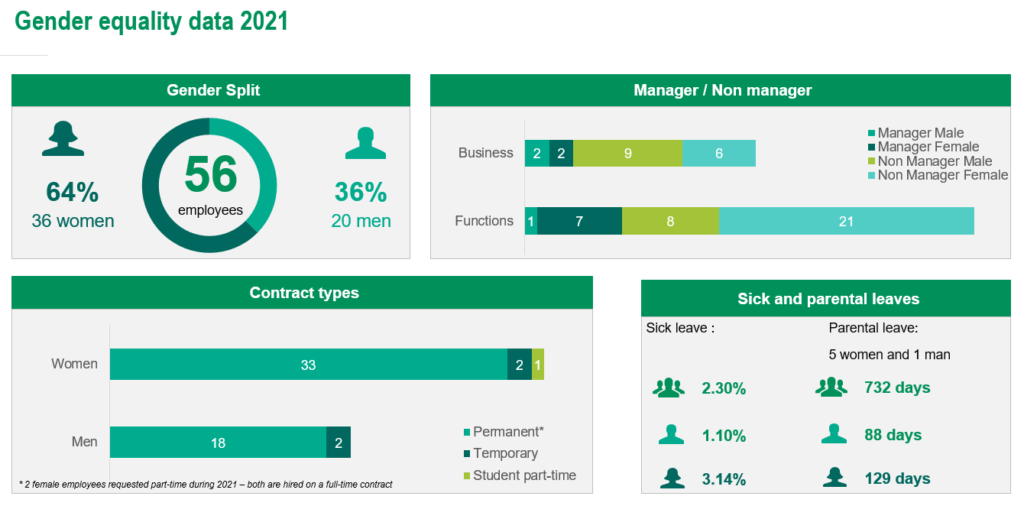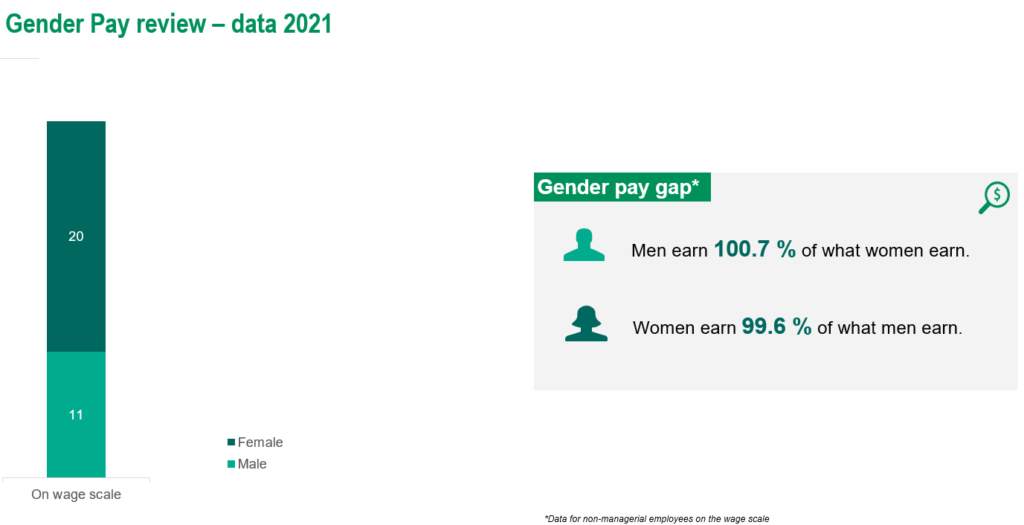Equality and Anti-Discrimination status and activities

Diversity and inclusion; risk assessment and measures
In line with the reporting requirements set out in the Equality and Anti-Discrimination Act § 26, we will in this report summarize how BNP Paribas SA Norway Branch (Corporate & Institutional Banking) for a number of years has focused on diversity and inclusion, resulting into a highly diversified group of employees and with few remaining barriers to equality.
Equality: in focus for many years
The BNP Paribas Group has over several years worked systematically to promote equality on a number of different areas. 2006 saw discrimination identified as one of the main operational risks, and a number of measures have been put in place – some with a global reach, others with a regional or local reach. 2014 saw establishment of the European Social Charter for Workplace Equality with the following targets:
- Guarantee equality of opportunity in career management
Concrete measures linked to e.g. recruitment practices, promotion and career development and access to vocational training. This included setting concrete targets for gender diversity and continuing to develop these targets. E.g. in 2014 the target was to reach 25% of women in Senior Management positions, while now there is a target to reach 40% of women on the Group’s Executive Committee by 2025 and that 50% of all identified leadership talents should be women. - Pursue wage equality between women and men
Concrete measures linked to identifying discrepancies, as well as identification of measures when unjustified gaps are discovered. Concrete targets on achieving wage equality and on maintaining this. Also concrete target that no maternity leave will have negative consequence of wage or career development. - Contribute to a better professional and private life balance
Concrete provisions to allow women and men to reconcile professional and private lives more effectively, e.g. through provisions relating to parental leave, part-time work and organization of work. - Encouraging women’s networks and sharing best practices
Facilitate and promote employee networks. Establish role of “diversity officers” in key entities of the Group, who will ensure diversity actions and follow up of diversity policy of BNP Paribas. - Promoting the diversity of staff representatives
Ensuring that trade unions and/or staff representatives commit to promoting workplace equality through diversity of representations as well as other measures.
The agreement also has provisions for monitoring the application of the agreement, through annual reporting by all entities. BNP Paribas SA Norway Branch has for a number of years reported on key indicators, and the results are part of the annual financial report for BNP Paribas SA. Universal-registration-document-and-annual-financial-report-2020 (invest.bnpparibas)
Local risk assessment: risks, causes and measures
At BNP Paribas SA Norway branch, local management and the employee representatives conducted a review to assess what are the key risks concerning equality as well as to identify any potential risk or source of discrimination.
- Regular risk assessments: HR regularly performs risk assessments, and risk of discrimination in the various HR processes are identified as low. Based on key indicators, we have a highly diversified work force – a result of focusing on this area for a number of years. To date, no suspicion or claim for discrimination seen or registered along with no barriers to equality found in our local organization.
- Bias: Our largest risk is likely to be unconscious bias amongst our staff or managers, which could lead to statements and/or decisions perceived as discriminatory. However, with recent years focus on the Code of Conduct, Respect for Colleagues supplemented by the strong focus on diversity, we believe this risk is limited. Having an active HR role involved in all processes linked to recruitment, mobility, training and compensation is a central risk-mitigating factor and contributes to increasing awareness amongst managers and employees. All employees were encouraged to join training on unconscious bias in 2020.
- We have put diversity on the agenda in recent years. In 2020 and 2021, via organized local events in connection with BNP Paribas Diversity & Inclusion week. The purpose of this has been to raise awareness amongst our employees, celebrate our diversity and identify ideas to continue our focus on these topics.
- Employee networks: 2020 saw the establishment of our Nordic PRIDE network and in 2021 the Nordic Multicultural Network. Both networks are employee driven, with strong support from both HR and Management. These networks have organized multiple activities open to all employees. The networks are pro-active partners promoting diversity related topics and facilitating increased awareness among employees and managers.
- Gender balance: continue to work for greater gender balance in specific teams, such as Compliance, HR and Operative control teams (all previously 100% female), with targets for gender balance in our talent program (as of end 2021; 60% female in Norway, while in 2020: 80% female), local Norwegian management team (end 2021:60% female, end 2020: 67% female)
- Cultural diversity: For a number of year we have recruited employees with diverse backgrounds. As of end, 2021 we have 21 nationalities represented amongst our employees and the cultural diversity is even greater. We have a work environment where employees are welcome to share and be proud of diversity, whether this diversity is cultural or ethnic background, gender/sexual identity, religious or political beliefs or other factors.
- Ability/disability: we do not currently have employees with a declared/registered disability, but we regularly have employees requiring facilitation linked to physical or psychosocial challenges. We integrate this facilitation in to how we work and how managers follow up their teams, to enable a work environment that is as supportive as possible. We have also in 2021 reached out to NAV, to signal our interest to co-operate on some of their initiatives to provide relevant work experience to disabled or other with work challenges.
- Work-life balance: Well before the pandemic, a flexi time system was already established. This enables employees to manage their daily work and outside of work activities in a quite flexible manner, as well as to adapt to changes in daily workload. The pandemic saw extensive remote working, and following the pandemic a Nordic Remote working policy was established in late 2021 – enabling the majority of our employees to work remotely up to 50% of the time, in addition to the flexi time system
Status of gender equality


Doing pay review in a small organization such as BNP Paribas SA Norway Branch is challenging for a number of reasons:
- Small organization, with a number of specialized roles
- Most teams consist of 1 – 5 people, with different levels of seniority and experience – hence data comparison is difficult from a statistical point of view. The risk of easy identification of individuals makes the sharing of data challenging.
- Front-office roles (income generating roles) with a significant component of variable compensation are not directly comparable with back-office/support functions roles.
Hence, our pay review is a combination of looking at comparable data where we believe we have sufficient data, along with a qualitative assessment. To conclude
- When reviewing the population of non-managerial roles paid according to the Banking Sector salary grid (31 of 56 employees), we find that there is limited difference between average total compensation for women and men. Women are paid 99.6% of men’s salary.
- When looking at the remaining population, we find larger differences. These differences are more difficult to quantify, due to the lack of relevant comparison/small populations. The gender pay differences we have identified are mainly linked to the following:
- Structural difference; there are more women than men in support functions, and more men in front-office roles than women. Within support functions, we find more women managers, whilst there are more male managers in front-office roles. We find limited gender differences in pay within support functions.
- Career development; more men in senior roles hired externally or through mobility processes with opportunity for pay review, whilst more women in similar roles have gradually extended scope and likewise gradual salary development (with limited annual salary guidelines a restricting factor).
- Calculated variable compensation is based on contribution and presence for a given year. Absences, such as long-term sick leave or parental leave, will affect variable compensation levels. As more women than men have long term absences, this also has an impact on variable compensation levels and thus total compensation for individuals in a given year while reflecting a pro rata approach.
- Seniority is a key element to consider when comparing compensation levels within similar roles, be that front office or back office/support functions and explains a large part of the variation we have observed.
Measures linked to gender pay differences
- Previously we did encounter managers who prioritized employees at work during the annual compensation review. HR and Management have ensured that reviews of all employees are according to the same principles, including employees on long-term leaves (sickness or parental leave).
- We have implemented that all employees returning from parental leave of minimum 5 months are entitled to an additional salary increase, in line with specifications in the banking sector collective agreement.
- In 2021, when providing input for the salary guidelines for 2022, we also included a specific allocation for equal pay. With implementation as part of the 2022 compensation review process.
To conclude, BNP Paribas Norway branch is committed to remaining vigilant on gender pay differences that may arise remediating accordingly. Additionally it is our ambition to hire more women in front-office roles and more men in support functions to create a true balance, and we will continue offering new hires a market level salary reflecting their competence and qualifications indifferently of gender.